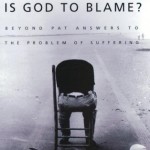We run our website the way we wished the whole internet worked: we provide high quality original content with no ads. We are funded solely by your direct support. Please consider supporting this project.
The Reality of Satan and the Spiritual Realm
A theme that underlies Jesus’ entire ministry is the apocalyptic assumption that creation has been seized by a cosmic force and that God is now battling this force to rescue it. Jesus understood himself to be the one in whom this battle was to be played out in a decisive way. The assumption is evident in almost everything Jesus says and does.
Jesus refers to Satan as “the prince” (archon) of this present age three times (Jn 12:31; 14:30; 16:11). The term archon was used in secular contexts to denote the highest official in a city or region. In short, Jesus acknowledges that Satan is the highest power of this present fallen world, at least in terms of his present influence. When Satan offers Jesus all “authority” over “all the kingdoms of the world,” Jesus does not dispute his claim that it was his to offer (Lk 4:5-6). Other writings explicitly teach that the whole world is “under the power of the evil one” (1 Jn 5:19), for Satan is “the god of the world” (2 Cor 4:4) and the ruler of the power of the air” (Eph 2:2).
Jesus addresses this evil “prince” as the leader of a relatively unified and pervasive army of spiritual powers and demons. Satan is thus called the “ruler of the demons” (Mt 9:34), and fallen angels are called “his angels” (Mt 25:41). On the basis of this assumed military unity, Jesus refutes the Pharisees’ contention that he exorcises demons by the power of Satan rather than the power of God. If this were so, Jesus argues, Satan’s kingdom would be working against itself (Mk 3:24) and could not exhibit the power it exhibits in this world.
Correlatively, Jesus taught that those who wish to make headway in tearing down this evil kingdom and in taking back the “property” of this kingdom must first tie up “the strong man” who oversees the whole operation (Mk 3:27). This could only be done when “one stronger than he attacks him and overpowers him” and thus “takes away his armor in which he trusted” (Lk 11:22). This, in a nutshell, is what Jesus understood himself to be doing by his teachings, healings, exorcisms and especially by his death and resurrection. His whole ministry was about overpowering the “fully armed” strong man who guarded “his property” (Lk 11:21)—the earth and its inhabitants who rightfully belong to God.
Jesus tied up the strong man so that he (and later, his church) could pillage the strong man’s kingdom. In fact, this is what Jesus’ teaching about the kingdom of God is all about. In the context of Jesus’ ministry, it is a warfare concept. “If it is by the power of God that I cast out demons,” Jesus teaches, “then the kingdom of God has come to you” (Lk 11:20). Where God reigns, Satan and his demons cannot. But otherwise, if the earth is to become the domain in which God is king (the kingdom of God), then it must cease being the domain in which Satan is king. This is what Jesus came to accomplish. He came to “destroy the works of the devil” (1 Jn 3:8: Heb 2:14) and to establish God’s domain on earth.
Every exorcism and every healing—the two activities that most characterize Jesus’ ministry—marked an advance toward establishing the kingdom of God over and against the kingdom of Satan. Consequently, in contrast with any view that would suggest that disease and demonization somehow serve a divine purpose, Jesus never treated such phenomenon as anything other than the work of the enemy. He consistently treated diseased and demonized people as casualties of war.
It is curious that the evil one to whom the Bible directly or indirectly attributes all evil has played a rather insignificant role in the theodicy of the church after Augustine. This, I contend, is directly connected to the fact that the church generally accepted the blueprint worldview that Augustine espoused. If we assume that there is a specific divine reason for every particular event that transpires, including the activity of Satan, then the ultimate explanation for evil cannot be found in Satan. It must rather be found in the reason that God had for ordaining or allowing him to carry out his specific activity. The New Testament, I submit, does not share this assumption.
—Adapted from Satan and the Problem of Evil, pages 35-37.
Category: General
Tags: Blueprint Worldview, Evil, Satan, Satan and the Problem of Evil, Spiritual Warfare, Warfare Worldview
Topics: Spiritual Warfare, Cosmic Conflict, The Problem of Evil
Related Reading

Quotes to Chew On: Prayer and Finitude
“We pray as we live: in a sea of ambiguity. This is not because we are fallen but because we are finite. And we are inclined to forget we are finite. We ignore the ambiguity that accompanies our finitude, and thus we claim to know what we can’t know. We reduce the unfathomable complexity of…

Storming the Gates of Hell
Jesus said: “I will build my church, and the gates of Hades will not prevail against it.” (Mt 16:18) To understand Jesus’ teaching here, there are a few things you should know. First, “Hades” was the standard term for the underworld, which means that Jesus was probably referring to the whole of the Satanic kingdom.…

Who Rules Governments? God or Satan? Part 2
In the previous post, I raised the question of how we reconcile the fact that the Bible depicts both God and Satan as the ruler of nations, and I discussed some classical ways this has been understood. In this post I want to offer a cross-centered approach to this classical conundrum that provides us with…

Love Conquers All
Paul prayed in this way for the church at Ephesus: I pray that, according to the riches of his glory, [God] may grant that you may be strengthened in your inner being with power through his Spirit, and that Christ may dwell in your hearts through faith, as you are being rooted and grounded in…

What Hinders Answers to Prayer
Prayer is powerful and effective, but it’s not magic. There is no automatic guarantee that what we’re praying for is going to come to pass, even when we’re praying with faith and in accordance with God’s will. Prayer is a form of co-laboring with God to change the world in a Kingdom direction. Yet, it’s…

Who Needs to Pray and Fast? (podcast)
Greg puts a bow on our shortest episode ever. Episode 634 http://traffic.libsyn.com/askgregboyd/Episode_0634.mp3

